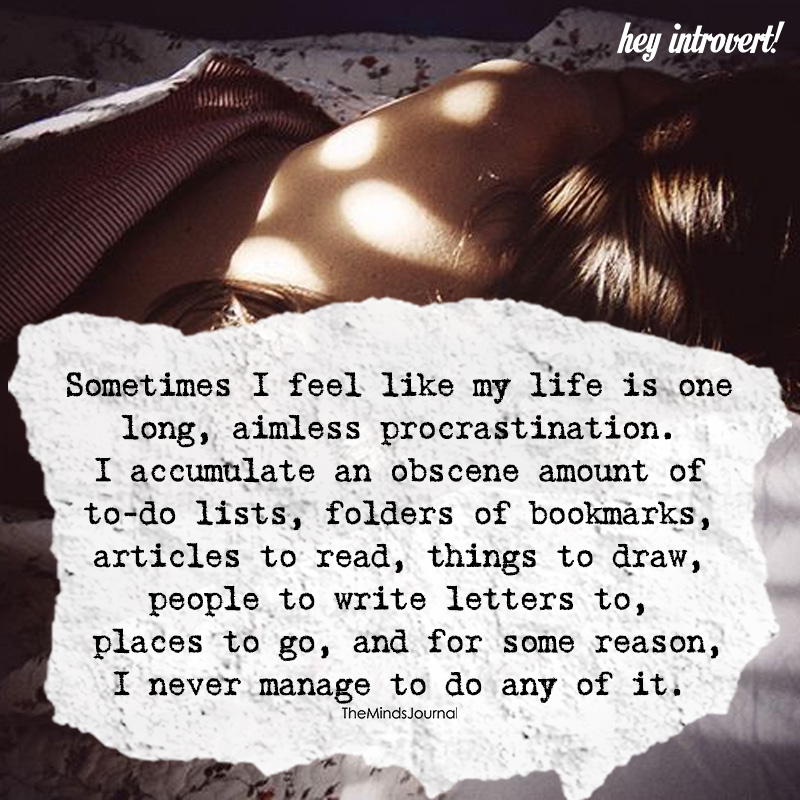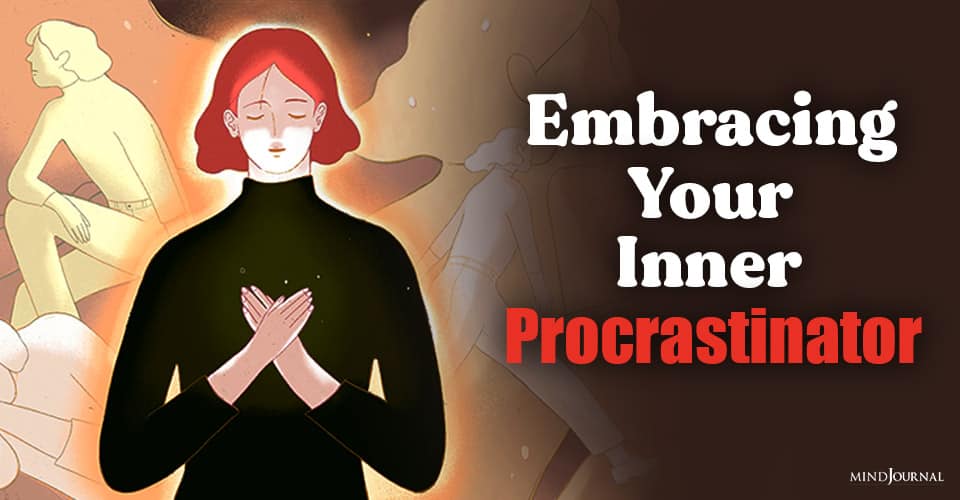Do you think you are a procrastinator? Are you fed up of it? How can you embrace your inner procrastinator?
There’s something I find myself learning over and over again. Or maybe it’s more accurate – and more kind – to say that I’m continually deepening my understanding of it. It crops up repeatedly, especially when I feel I’m falling behind in whatever priorities I’ve set for myself.
To put it bluntly, it crops up when I find myself procrastinating.

The “it” I’m talking about is a tidbit of insight that has comforted me and enriched the quality of my life time and time again.
Here it is:
There is nothing wrong with procrastination.
This is tremendously good news, particularly if you’ve burdened yourself with the shameful label of “procrastinator” – which, in our fast-paced, action-oriented culture, is only slightly better than being labeled a liar. Or a loser. Or someone who doesn’t think that mobile devices are all they’re cracked up to be.
Believe me, I’m very familiar with the squirmy, uncomfortable feeling that arises when I keep putting off something I need – or even want – to do. And in contrast, I know how amazing it feels to be in the flow of productivity and accomplishment. So why, you might ask, do I think there’s nothing wrong with that sludgy, no-progress state we call procrastination?
It has to do with the word “wrong.” Let’s suspend the label of “procrastination” and describe the experience in a neutral way: it is a choice not to do something in this moment. Or perhaps, even more simply, it is a choice made among alternatives. Again – in this moment.
The reason it feels bad is that we’re judging our choice as wrong. And in doing so, we’re subtly judging ourselves as wrong, or ineffective, or lacking in some way. It’s the self-judgment that hurts. Let me pause here and offer another tidbit that has enriched the quality of my life time and again:
Read Understanding And Overcoming Procrastination
Self-judgment will never get you where you want to go. Ever.
See if you can feel how liberating it would be to drop the word “procrastination” – and all the judgment it implies – and simply allow yourself to make fresh choices, moment to moment, about what you’re willing and able to do. I’ve discovered that what we call procrastination is simply resistance – and resistance is a message from our inner guidance system that we’ve somehow strayed from our own genuine desires or natural rhythm, or both.
Consider the possibility that your resistance to doing something may be…
- A natural aspect of your creative cycle, which requires periods of incubation, integration and rest.
- A signal that what you think you “should” do isn’t really what you’re genuinely willing to do, or what would serve you best.
- A reflection of a fear you may have about moving forward which, until it is acknowledged, cannot be challenged or released.
- An invitation to pause and modify your plans based on new information.
In the absence of self-judgment, resistance is an opportunity to slow down and learn something about yourself.
I could share numerous examples of clients with whom I’ve worked, who berated themselves harshly for procrastinating about something only to discover that their resistance was simply trying to get their attention – their loving, curious attention. What we call procrastination is an invitation to greater self-awareness and deeper self-regard.
Read 7 Inner Archetypes That Cripple Your Confidence and Self-Respect
I remember a former student of mine who was immensely frustrated with herself for not making progress on her masters’ thesis. The topic for the thesis has actually been suggested by her boyfriend, who was a physician. My client had no genuine interest in the subject; what she really wanted to write was a novel. But she’d chipped away at the thesis, slowly and grudgingly, until her own resistance ground her to a halt.
That’s when she finally admitted to herself that the thesis had nothing to do with who she was or what she wanted to create. She was working on it in an effort to please – and to appease – her boyfriend. She was both afraid of him and in awe of him. He was an abusive man and the relationship was not a healthy one, something she had avoided facing for a long time.
It was the resistance to the thesis that finally got her attention. As she awakened more fully to who she is and what she wanted for her life, she chose to end the relationship. She also gave herself permission to suspend work on the thesis. Shortly thereafter, she landed a job teaching creative writing at a local community college, which she loved.
Read 8 Reasons For Lack of Motivation and Enthusiasm (And How To Overcome It)
Had she not judged herself as a procrastinator, she could have more readily seen that her resistance wasn’t a character flaw, it was a message.
The same is true for you. Your resistance – formerly known as procrastination – has information for you. Before assuming you are lazy or simply unmotivated, pause. Refuse to judge yourself. Determine to love yourself instead. Get curious about what your resistance may be telling you about who you really are and what you really want for your life. And be willing to listen.
Are you ready to embrace your inner procrastinator?
Written by: Suzanne Eder Schedule your free consultation with Suzanne to discover if working with her may be your perfect next step in creating a deeply fulfilling life. Email suzanne@suzanneeder.com for more information. Originally appeared on: Suzanneeder.com Republished with permission.









Leave a Reply